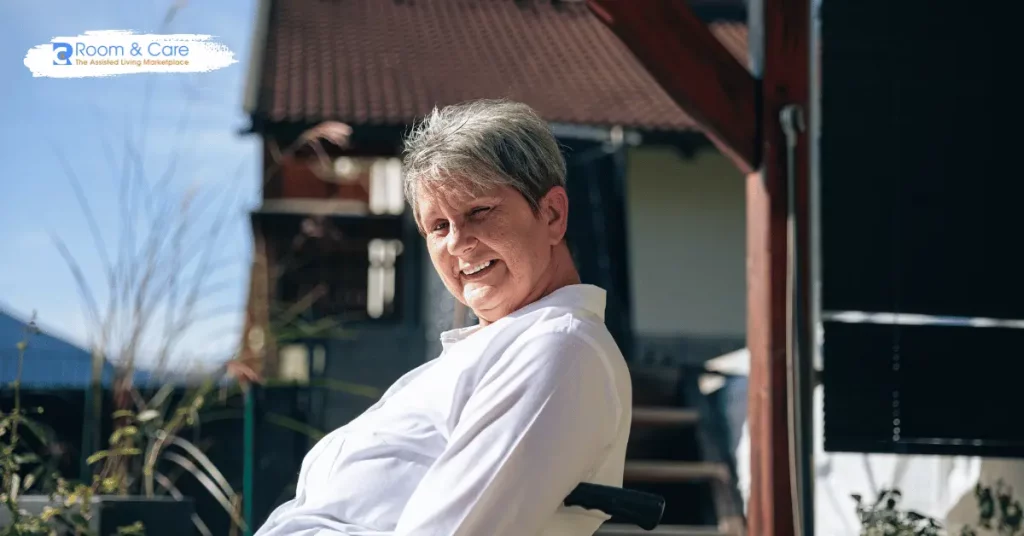

Many face the decision of how and where they want to live during their retirement years. The options are abundant, and one that often stands out is independent living. The benefits of independent living are extensive, ranging from enhanced quality of life to increased safety, better social engagement, and reduced stress. In this comprehensive guide, we will explore the advantages of independent living, help you understand key factors when making this decision, and offer practical advice to ensure a smooth transition.
Whether you’re a senior considering a change or a family member helping a loved one, this post provides valuable insights to guide you. And remember, when you’re ready to explore independent living communities, Room & Care is here to connect you with the best options—without referral fees or middlemen, ensuring cost-effectiveness and direct access to the best care.
Independent living is a lifestyle choice designed for seniors who want to maintain their independence while enjoying a supportive, convenient community. It offers housing options specifically tailored to older adults who don’t require assistance with daily activities but want a living environment that reduces the burden of home maintenance, offers social opportunities, and provides easy access to amenities.
These communities typically offer private apartments or cottages with shared common areas like dining rooms, gardens, and recreational facilities. Some independent living communities are part of larger campuses that offer a continuum of care, including assisted living and nursing home services. However, independent living is focused on allowing seniors to live independently for as long as possible while enhancing their quality of life.
One of the most significant benefits of independent living is the preservation of personal freedom. Seniors can enjoy their retirement years without the burdens of maintaining a large home or managing day-to-day chores such as yard work or repairs. Independent living communities typically handle all maintenance, allowing residents to focus on enjoying life.
The freedom gained from independent living extends beyond household tasks. Seniors can pursue hobbies, travel, and spend time with family and friends without the constraints of everyday responsibilities. The independence that comes with this lifestyle fosters a sense of autonomy, which is essential for maintaining confidence and a positive outlook on life.
Safety is a top priority for seniors, and independent living communities are designed with this in mind. Features like secure entrances, 24-hour staff, and emergency response systems provide peace of mind for both residents and their families. According to the Centers for Disease Control and Prevention (CDC), falls are a leading cause of injury among older adults. Independent living communities often have safety features such as slip-resistant flooring, grab bars, and well-lit hallways, helping to reduce the risk of accidents.
Beyond physical safety, independent living communities offer emotional security as well. Residents can rest easy knowing that help is readily available if needed, whether for a minor issue or an emergency. This level of security allows seniors to enjoy their independence without the worry that often comes with living alone.
Social isolation is a growing concern among seniors, with many facing loneliness due to the loss of spouses or friends, retirement, or mobility issues. Independent living communities address this issue by fostering a sense of community and providing numerous opportunities for social interaction. A study by the National Institute on Aging highlights that social engagement is crucial for maintaining mental and physical health in older adults.
In an independent living community, residents can participate in organized events, group activities, and casual socializing in common areas. Whether it’s attending a fitness class, joining a book club, or simply enjoying a meal with neighbors, these social interactions can help prevent feelings of loneliness and improve overall well-being.
One of the key benefits of independent living is the simplification of daily life. Many communities offer services such as housekeeping, laundry, and dining, reducing the burden of everyday tasks and allowing seniors to focus on what matters most to them. For seniors who no longer wish to cook regularly, meal plans or dining options are often available, providing nutritious and delicious meals without the hassle of grocery shopping and preparation.
Transportation services are also commonly offered, making it easy for residents to attend medical appointments, run errands, or enjoy outings without the stress of driving. This level of convenience enhances the overall quality of life and allows seniors to enjoy their retirement fully.
Independent living communities are designed to offer a wide range of amenities that enhance residents’ physical, mental, and emotional well-being. Fitness centers, swimming pools, walking paths, art studios, libraries, and wellness programs are just a few examples of the resources available to residents. These amenities help seniors stay active, engaged, and fulfilled, contributing to a higher quality of life.
Many communities also offer on-site healthcare services or easy access to medical facilities, providing an added layer of convenience and security for residents who want to prioritize their health.
Another notable advantage of independent living is financial predictability. Seniors living in independent communities often pay a set monthly fee that includes rent, utilities, and sometimes meals and activities. This all-inclusive structure allows for easier budgeting and eliminates the unpredictability of home repairs, rising utility costs, or unexpected expenses.
While the cost of independent living varies depending on the community and location, it often provides better value when compared to the cumulative expenses of maintaining a private home. Seniors can enjoy peace of mind knowing their monthly expenses are predictable and manageable.

Location is one of the most important factors to consider when choosing an independent living community. For many seniors, staying close to family is a top priority. Being near loved ones can provide emotional support and allow for more frequent visits, helping to ease the transition into a new living arrangement.
Additionally, consider the proximity to medical facilities, shopping centers, restaurants, and recreational activities. A well-located independent living community can enhance a senior’s quality of life by making it easy to access essential services and enjoy leisure activities.
While independent living communities can be a cost-effective option, it’s essential to have a clear understanding of the fees and what they cover. Some communities may charge extra for services such as housekeeping, transportation, or additional meals, so be sure to ask for a detailed breakdown of costs.
It’s also important to consider long-term budgeting. Even if a community fits within your current budget, will you be able to afford it in the future? Planning for potential increases in fees or unexpected expenses can help ensure financial stability over the long term.
Each independent living community offers different amenities and lifestyle options, so it’s important to choose one that aligns with your preferences. Are you looking for a community that offers extensive recreational activities, or do you prefer a quieter environment? Do you want access to a fitness center, pool, or golf course? Are there clubs or educational opportunities that interest you?
Create a list of must-have amenities and lifestyle features that will contribute to your happiness and well-being. This will help you narrow down your options and find the community that best fits your needs.
While independent living is designed for seniors who are generally healthy and active, it’s important to consider what will happen if your health needs change in the future. Some independent living communities are part of larger continuing care retirement communities (CCRCs), which offer a range of services including assisted living, memory care, and skilled nursing.
Choosing a community that offers a continuum of care can provide peace of mind knowing that if your health needs change, you can transition to a higher level of care without having to move to a new location.
Every independent living community has its own unique culture, shaped by the residents and staff. It’s essential to visit several communities and spend time in each to get a feel for the atmosphere. Are the residents engaged and happy? Is the staff friendly and helpful? Do you feel welcomed and comfortable?
Choosing a community that aligns with your values and lifestyle is key to a successful transition. The right community will feel like home, offering a sense of belonging and connection.
Downsizing from a larger home to a smaller space in an independent living community can be a daunting task. Start the process early by sorting through your belongings and deciding what to keep, donate, or pass on to family members. Focus on items that hold sentimental value or are essential to your daily life.
Having fewer belongings will make the move easier and help you create a comfortable, clutter-free living space in your new community.
Many independent living communities offer prospective residents the opportunity to attend events, meals, or activities before making a commitment. Take advantage of these opportunities to meet current residents, participate in activities, and get a feel for the community’s culture.
This pre-engagement can make the transition smoother and help you feel more confident in your decision.
One of the most rewarding aspects of independent living is the opportunity to build new relationships and engage in social activities. Take an active role in your new community by joining clubs, attending events, and introducing yourself to neighbors. By staying socially engaged, you’ll foster a sense of connection and belonging that can greatly enhance your overall happiness.
Moving to an independent living community is a significant life change, and it’s important to keep the lines of communication open with your family. Share your reasons for the move, discuss your goals for this next chapter, and reassure your loved ones that you are making a positive choice for your future. Involving family members in the decision-making process can provide them with peace of mind and strengthen your support system during the transition.

Independent living is designed for seniors who are able to manage their own daily activities without assistance, while assisted living provides help with tasks such as bathing, dressing, and medication management. Independent living communities focus on convenience and lifestyle, offering amenities and social opportunities without the level of personal care found in assisted living facilities.
Yes, most independent living communities offer housing options that accommodate couples. Whether in a shared apartment or a small home, couples can enjoy the benefits of independent living together while accessing the amenities and services offered by the community.
Independent living is ideal for seniors who are generally healthy and do not require ongoing medical care. However, many independent living communities are part of larger campuses that offer higher levels of care, such as assisted living or skilled nursing, should your health needs change over time.
Choosing the right independent living community involves visiting multiple locations, asking questions, and evaluating your needs and preferences. Consider factors such as location, amenities, cost, and community culture. The right fit will feel comfortable, welcoming, and aligned with your lifestyle.
The benefits of independent living are numerous and varied, offering seniors a lifestyle that promotes freedom, safety, social engagement, and financial predictability. With the right community, seniors can continue to live independently while enjoying a rich array of amenities and services that enhance their overall quality of life.
At Room & Care, we’re dedicated to helping you find the perfect independent living community, assisted living facility, or nursing home—without referral fees or middlemen. Our service ensures direct access to the best care options tailored to your unique needs. Ready to learn more? Visit Room & Care today and take the next step toward a fulfilling, worry-free lifestyle.